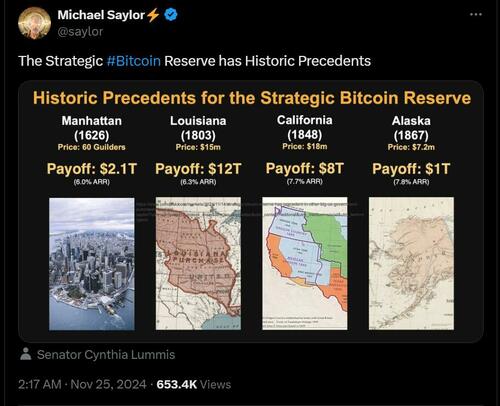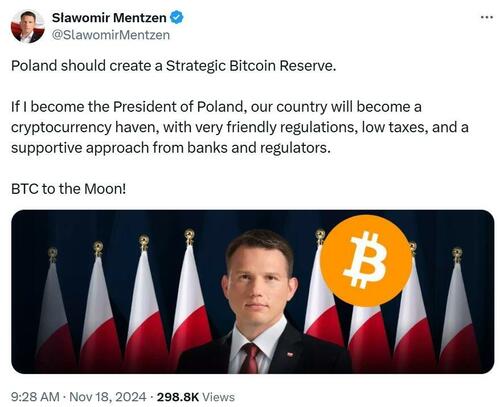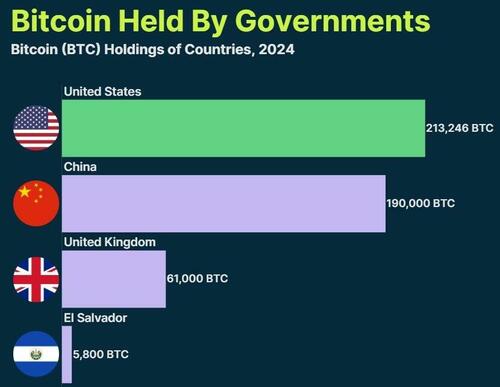US Bitcoin Reserve Is Possible, But Not Without Downsides
Authored by Stephen Katte via CoinTelegraph.com,
During his 2024 election campaign, United States President-elect Donald Trump made many crypto-related promises, including establishing a “strategic Bitcoin stockpile.” The idea has since picked up steam both in the United States and abroad.
While there has been plenty of talk, a clear roadmap and timeline for the implementation of a Bitcoin strategic reserve haven’t been hashed out by lawmakers yet.
Speaking to Cointelegraph, Tim Ogilive, global head of institutional at crypto exchange Kraken, said at its core, establishing a strategic Bitcoin reserve is a “straightforward process.”
Source: Michael Saylor
“A sovereign buys Bitcoin and secures it with a qualified custodian. This parallels how governments manage other strategic reserves, like gold in Fort Knox or oil in national stockpiles,” he said.
“Bitcoin’s digital nature doesn’t change this fundamental principle — commodity reserves require the proper infrastructure and expertise for storage and security,” Ogilive added.
According to Ogilive, El Salvador and Bhutan have already “proven that a reserve is feasible,” showing that the primary barriers to setting it up are not “technical or market-driven.”
In 2021, El Salvador adopted Bitcoin as a legal tender and bought about 200 coins. The country has since increased its holdings to 5,942 Bitcoin as of November, worth $571.6 million at current prices.
Bhutanese officials confirmed in 2024 that the kingdom had been mining Bitcoin since April 2019 and still holds about 12,206 Bitcoin, after selling 367 on Nov. 15, worth about $117.9 million at current prices.
A Bitcoin reserve is not without drawbacks
In July, US Senator Cynthia Lummis introduced a bill to establish a Bitcoin strategic reserve. Pennsylvania lawmakers also introduced legislation in the state’s House of Representatives to permit its treasury to hold up to 10% in Bitcoin.
Polish presidential candidate Sławomir Mentzen has vowed to create a Bitcoin reserve if he wins next year’s election. A newly proposed bill in Brazil’s Congress is also aimed at establishing a sovereign federal Bitcoin reserve.
Source: Sławomir Mentzen
Along with the positives of the concept, such as a Bitcoin reserve being a hedge against inflation and the growth value possibly helping reduce debt, there are also concerns.
A few drawbacks that have been flagged are the volatility of the market eroding the value of the reserve, storing the Bitcoin securely so it isn’t hacked or stolen and keeping any private keys so they aren’t lost.
Ogilive says another potential issue may be the concentration of ownership. If a government such as the US started accumulating large amounts of Bitcoin, it could “initially concentrate ownership.”
In the long run, though, Ogilive thinks it could ultimately bolster Bitcoin’s long-term narrative as the “premier store of value”.
Timothy Cradle, chief compliance officer at cross-border blockchain payment service Instarails, told Cointelegraph that while a Bitcoin reserve is possible, he is unsure if government involvement in crypto would be without hiccups.
Governments haven’t always made outcomes for the crypto industry, with the US Securities and Exchange Commission (SEC) under the Biden administration causing plenty of headaches for crypto firms with record numbers of fines and penalties in 2024.
“If the US government holds Bitcoin, then it takes an interest in the price of Bitcoin, which further means it will implement policies to manipulate the price, up or down, at times when it needs to do so,” Cradle said.
“If you go back to as recently as 2022, President Joe Biden released 200 million barrels of oil from the strategic petroleum reserve to mitigate price spikes caused by the Russian invasion of Ukraine.”
Cradle speculates that with a strategic Bitcoin reserve, the president might unilaterally drop the price of Bitcoin in the same way.
“I would also be curious how they decide to fill the reserve,” he said.
“If, as has been discussed, they choose to withhold Bitcoin seized and held by the US Marshals Service, this could create a perverse incentive to seize more over time and be more aggressive in seizures,” Cradle added.
The US government already holds about 213,297 Bitcoin worth over $2 billion, acquired through seizures, with the largest portion coming from shutting down the online the Silk Road black market in 2013.
According to CoinGecko, governments around the world hold about 2.2% of Bitcoin’s total supply, some 471,380 Bitcoin.
Governments around the world are collectively one of the largest Bitcoin holders. Source: CoinGecko
Accumulating more Bitcoin for the reserve could prove tricky. According to the Blockchain Council, more than 19.7 million Bitcoin have been awarded to miners in block rewards.
Bitcoin’s pseudonymous creator Satoshi Nakamoto’s white paper dictates that only 21 million are available, meaning most are already in circulation.
Cradle said that while the idea of a Bitcoin reserve is feasible, he doubts it will happen soon because there doesn’t appear to be a clear rationale for the US government.
He agrees that a possible upside could include safeguarding economic stability and enhancing national security through financial independence, but “if or how well Bitcoin supports these outcomes remains to be seen.”
“At best, I would expect an executive order to explore the possibility of establishing a reserve and a final report by the end of the year with a definitive recommendation,” Cradle added.
Bitcoin reserve roadmap doesn’t exist yet
A growing list of firms have taken the plunge and added Bitcoin to their balance sheets this year, including YouTube alternative Rumble, artificial intelligence company Genius Group and Japanese investment firm Metaplanet.
Michael Saylor’s MicroStrategy tops the list with 386,700 Bitcoin, worth about $37 billion, according to the firm’s portfolio tracker.
MicroStrategy has been steadily acquiring more Bitcoin for its stash, which is now worth over $37 billion. Source: Saylor Tracker
Steven Lubka, head of private clients at the Bitcoin platform Swan Bitcoin, told Cointelegraph that a government looking to create a Bitcoin reserve would have a few options.
“It can be a stockpile where they just hold the Bitcoin they already have. This can be done with the stroke of a pen by the president. It is the easiest form,” he said.
“Second, you can have a reserve where the US actively buys Bitcoin below a certain size; this can also be done by the executive easily above a certain size, meaning above a certain amount of purchases per year, you do need congressional buy-in,” Lubka added.
According to Lubka, a Bitcoin reserve has minimal downsides, numerous benefits and could become a reality since a number of pro-crypto candidates were elected to the US Congress.
Hundreds of pro-crypto candidates won seats in Congress, and industry leaders have suggested the US government will become the most pro-crypto in history, which should result in a more favorable regulatory environment.
“The upsides of a reserve are that it stabilizes the US balance sheet. It allows the US in times of treasury market dysfunction or war to not be taken out by its adversaries, impairing the functioning of its debt market,” he said.
“This is an important strategic option for the country and one that most people discount. I think the downsides are minimal. This isn’t a lot of money for the US. It costs us almost nothing,” Lubka added.
Bitcoin reserves a forward-thinking approach
Bil Qian, chairman of crypto investment firm Cypher Capital, told Cointelegraph that a strategic Bitcoin reserve isn’t only feasible — it’s a forward-thinking approach that “aligns with the evolving global financial landscape.”
An October report from crypto financial service MatrixPort found that global cryptocurrency adoption is approaching a significant milestone, with 7.51% of the world’s population now using digital currencies.
“Top VCs involved in blockchain have long seen the strategic importance of Bitcoin for sovereign nations, leading places like Abu Dhabi to launch a reserve through its sovereign wealth fund back in 2022,” Qian said.
“As sovereign nations and publicly listed companies continue to enter the market, Bitcoin’s value proposition will only strengthen, likely resulting in significant price appreciation,” he added.
Tyler Durden
Mon, 12/02/2024 – 13:25






